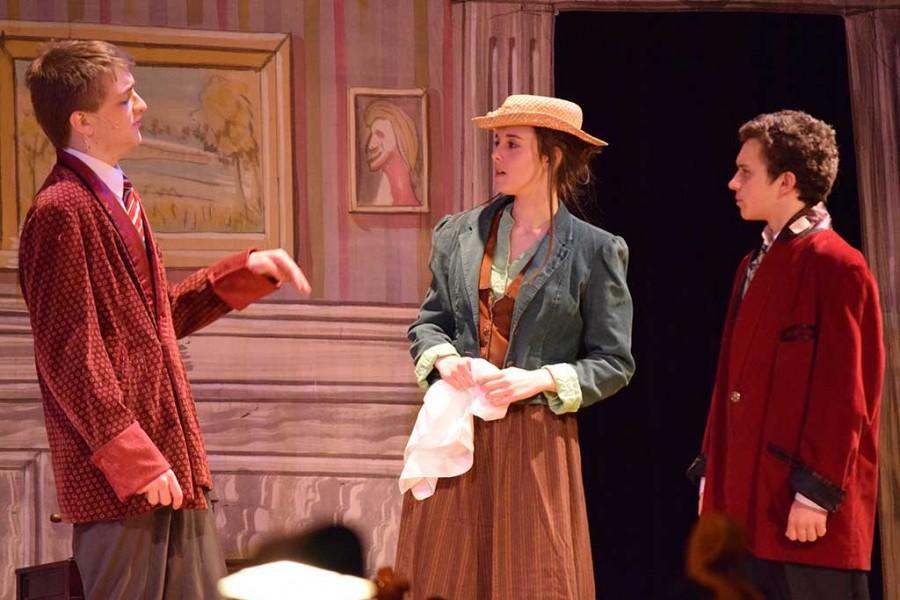The high school’s production of the classic musical My Fair Lady, under Mr. Kevin F. Harrington’s direction, dazzled the audience with its lively performances and impeccable acting.
My Fair Lady is Downton Abbey meets The King’s Speech. Based on the play Pygmalion by George Bernard Shaw, the musical recounts the story of a working-class cockney girl, Eliza Doolittle, who takes speech lessons from the uptight Mr. Higgins — a renowned linguist — in order to pass as an upper class lady.
Taking place in England during the twentieth century, Eliza makes her living as a flower girl, selling colorful blossoms to high society Londonites and is regarded as a “draggle-tailed guttersnipe.”
The very theme of this play — wrought delicately by the actors, as it is never said aloud, but heavily implied — is grounded in the societal structure of the era. While the upper class is able to lounge all day or expand their knowledge as they please, the working class is doing just that: working.
Gender roles are just as prevalent in shaping the musical; women are oppressed and objectified to the point of Mr. Higgins soliciting an answer to his question as to “Why can’t a woman be more like a man?”
The play makes it clear that Eliza is valued not for her character, but for the way she dresses and presents herself. Ultimately, My Fair Lady sets itself up to be rather unfair.
Which is why Eliza, portrayed by junior Hannah Bentivegna, is so brave. Instead of leaving her fate up to “A Little Bit of Luck,” like her sellout father does, Eliza marches up to Mr. Higgins and demands to be taught how to act like a lady, and she succeeds.
Both Bentivegna and senior Brian Bernhard, who took on the role of Mr. Higgins, shine in their leading roles. It truly takes talent to transcend across time and society, and both of the leading roles obviously have that talent.
Other fantastic performances were given by seniors William Halstead, Charles McGrath, and William Meurer, who portrayed Colonel Pickering, Freddy Eynsford-Hill, and Alfie Doolittle, respectively.
Clearly, during their high school careers, these students were able to cultivate and express their acting talent. MHS should be proud of students who develop such an extensive interest in entertainment. As much as this school loves its athletics, it is invaluably just as important, if not more, to celebrate a diverse and lively student body.
Of course, a performance is not complete without its mishaps. At one point during the opening night performance, during a scene in which Mr. Higgins was teaching Eliza how to speak “proper English,” the candle that was supposed to train her to speak with proper vowel pronunciation would not stay lit.
To the delight of the audience, Bernhard was not fazed. Instead, he alleviated the mishap with clever improvisation by exclaiming “Oh my!” several times and finally expressing, “Well, it’s the principle that matters anyway,” launching the audience into laughter and applause. He succeeded in staying calm and in doing so did not break his character.
Throughout the performance, there were several moments that held their own in helping to bring the musical to life. This year’s ensemble, a passionate group of actors and actresses who sung and acted with ease and distinct talent, was vital in allowing these moments to shine.
One particular moment undoubtedly awed the audience. During the Ascot scene, the cast members stood perfectly still in synchronization with each other, leading perhaps the entire set of onlookers to believe for at least a second that they were witnessing some sort of wrinkle in time.
It was eerie, but thrillingly so. This scene, perfectly produced by the cast, made the confines of the society in which My Fair Lady takes place infinitely more clear. During such a time of conformity, what triumphs?
While perhaps the answer to this question is purposely posed without a clear answer, the true triumph of the night was the grandeur and exceptional execution of Massapequa’s My Fair Lady.

